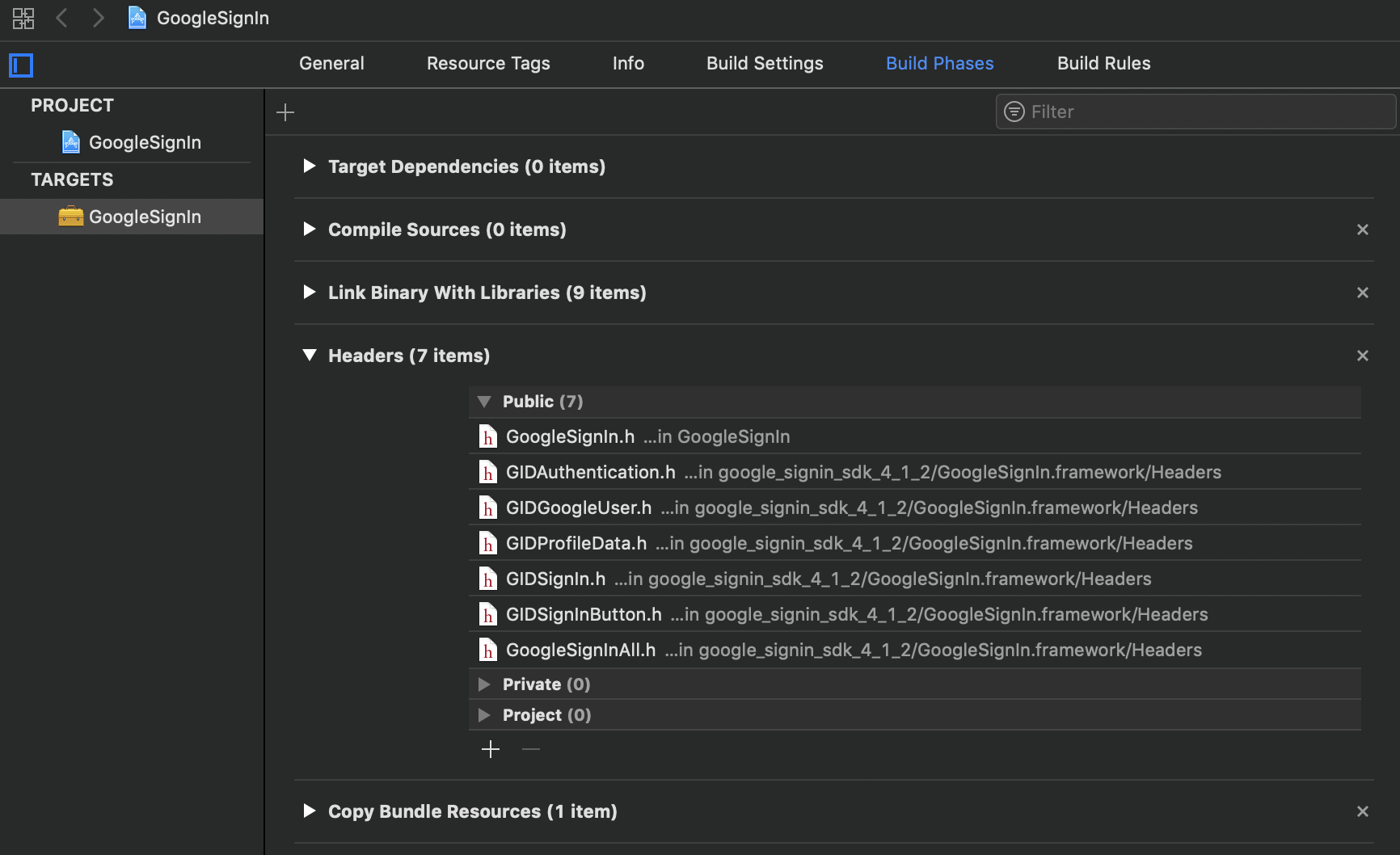This is a dynamic version of the iOS GoogleSignIn static framework. The Framework directory contains the result of building this framework and is built for iOS >= 9.3 for arm64 and armv7 based devices and for the intel-based simulator.
I just checked again and the current version of Google's framework (v4.4.0) still appears unsuited for use as a dependency within a .podspec file. I am getting an error message from Cocoapods: "target has transitive dependencies that include static binaries".
This is in the form of a Cocoapod. See "Podspec Note" below for rationale. See the .podspec file for the current version.
In your Podfile, at the very top of the file, put:
source 'https://github.com/crspybits/Specs.git'
Since SyncServer is a framework, I wanted a means to provide Google Sign In for iOS clients so that they didn't have to explicitly import GoogleSignIn. That is, I wanted to do this just like the way I'm doing this with Facebook and Dropbox: Just select the subspec in your Cocoapods Podfile and you are off to the races. However, Google Sign In doesn't make this easy-- at this time (early June 2018), Google provides static libraries. Well, you say, Cocoapods can now support static vendored_libraries. Yea! Hmmm. I tried doing this. I get a gnarly error: "unsealed contents present in the bundle root" from Xcode. I wasn't able to make progress with that issue.
Instead, I took the route of converting the Google Sign In framework to a dynamic framework using these instructions
This repo is the result of that process.
GoogleSignIn.xcodeproj is not part of the Cocoapod, but rather enables you to build the dynamic GoogleSignIn.framework
See https://stackoverflow.com/questions/5010062/xcodebuild-simulator-or-device and https://stackoverflow.com/questions/29634466/how-to-export-fat-cocoa-touch-framework-for-simulator-and-device
- Download the most recent version of the Google SDK from https://developers.google.com/identity/sign-in/ios/sdk/
- In the downloaded folder, you should see three main file/folders: GoogleSignIn.bundle, GoogleSignIn.framework, GoogleSignInDependencies.framework
- Rename the downloaded folder to "google_signin_sdk" (it should have been named something like "google_signin_sdk_4_4_0").
- Replace that named folder in the repo with the new "google_signin_sdk".
- I had to rename the file within the GoogleSignIn.framework/Headers/GoogleSignIn.h obtained from Google to GoogleSignIn.framework/Headers/GoogleSignInAll.h to work around a naming conflict.
- Note that the names of the header files in google_signin_sdk/GoogleSignIn.framework/Headers might have changed, and you might have to adjust these in GoogleSignIn.xcodeproj
- Make sure the headers for the library are all public:

- Read through the section
Link dependent frameworks to your Xcode projectin https://developers.google.com/identity/sign-in/ios/sdk/ to see if you need to add other (more) libraries. (I ran into some odd looking link issues when I didn't remember this).
Prior to 3/9/19, I had been having problems with following to generate a binary file output to run with the simulator. Previously, I'd been having to dig into the DerivedData output of Xcode after building for an example simulator device to actually get the simulator-built framework. HOWEVER, now this does seem to do the trick.
xcodebuild -target GoogleSignIn -configuration Release -sdk iphonesimulator ONLY_ACTIVE_ARCH=NO BUILD_DIR="build" BUILD_ROOT="build" clean build
The following builds for arm64 and armv7
I had to add -fembed-bitcode to OTHER_CFLAGS in the project build settings because I got "ld: bitcode bundle could not be generated" when I tried to build SharedImages. I also added this to the linker flags.
And I'm now making release builds because that seems to be the way to generate bitcode. See https://stackoverflow.com/questions/31233395/ios-library-to-bitcode
xcodebuild -target GoogleSignIn -configuration Release -sdk iphoneos ONLY_ACTIVE_ARCH=NO BUILD_DIR="build" BUILD_ROOT="build" clean build
Copy the framework structure (from iphoneos build) to the universal folder-- the lipo step only builds the executable, not the framework structure. Note that trash is just a command to move to the directory to the Trash folder.
trash Framework/GoogleSignIn.framework
cp -R "build/Release-iphoneos/GoogleSignIn.framework" "Framework/GoogleSignIn.framework"
Note we're replacing the non-fat binary in the step above with the fat binary.
lipo -create -output "Framework/GoogleSignIn.framework/GoogleSignIn" "build/Release-iphonesimulator/GoogleSignIn.framework/GoogleSignIn" "build/Release-iphoneos/GoogleSignIn.framework/GoogleSignIn"
Note that the name of the resulting framework must be GoogleSignIn-- i.e., it must match the name of the .bundle file-- or the graphics and text will not load into the Google Sign In button.
One of my struggles in developing this dynamic version of Google's framework was getting the GoogleSignIn.bundle to be properly accessed by the framework. The problem was that I was getting the GIDGoogleSignIn button appearing on the UI, but the graphics and text didn't appear-- and these come from the .bundle file. To deal with this, I have derived the form of the podspec I'm using here from Google's-- https://github.com/CocoaPods/Specs/blob/master/Specs/d/4/0/GoogleSignIn/4.1.2/GoogleSignIn.podspec.json (see also "See Podspec" link in https://cocoapods.org/pods/GoogleSignIn). See also https://stackoverflow.com/questions/50750862/using-google-sign-in-frameworks-in-a-cocoapod-subspec